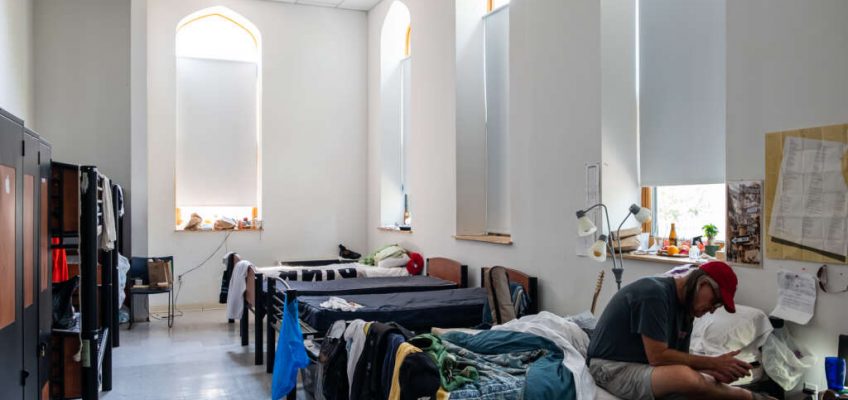“We never turn people away, yet the demand consistently exceeds resources. Despite these challenges, our programs are proven to reduce recidivism, emergency room visits, and homelessness—at a fraction of the cost of incarceration.”
A dormitory at Fortune Society’s transitional housing program Manhattan. (Photo by Adi Talwar)
Every day, our organizations witness people working hard to take responsibility for their actions and transform their lives. At the Center for Alternative Sentencing and Employment Services (CASES) and The Fortune Society, we are dedicated to helping people access the support they need to avoid incarceration and rebuild their futures. Yet Alternative to Incarceration (ATI) and Reentry programs remain critically underfunded, threatening the progress of thousands of New Yorkers.
ATIs are community-based programs that address the root causes that lead people to court involvement—untreated mental illness, unstable housing, and unemployment. Reentry programs help people returning from jail or prison rebuild their lives, reconnect with their families, and contribute to their communities.
We applaud the proposed $17 million restoration for ATI and reentry programs in Mayor Eric Adams’ Executive Budget. Without this funding, thousands of New Yorkers—disproportionately Black and Latine—will lose access to essential services. While this restoration is vital, it is not enough. The need far exceeds the current investment.
At CASES, our ATI programs serve more than 1,000 people each year. Case managers are stretched thin, managing large caseloads while trying to provide individualized care. At The Fortune Society, we face similar challenges: existing programs are operating beyond capacity. We never turn people away, yet the demand consistently exceeds resources. Despite these challenges, our programs are proven to reduce recidivism, emergency room visits, and homelessness—at a fraction of the cost of incarceration.
The humanitarian crisis at Rikers Island is growing worse. Over the past few years, the number of people detained in city jails has increased by nearly 50 percent. Of the more than 7,500 people currently incarcerated at Rikers, the vast majority are Black and Latine, and over half have a diagnosed mental illness.
Tragically, Rikers is often called the state’s largest mental health facility, but it offers little real care. Instead, people cycle in and out without the support they need to recover. ATIs, on the other hand, offer robust mental health care in the community: CASES’ Assertive Community Treatment program delivers mobile mental health care in our neighborhoods, leading to a 70 percent decrease in re-arrest rates over two years. Instead of being released with no support, participants receive ongoing help with mental health, education, employment, and housing.
The Fortune Society, meanwhile, provides transitional housing for 523 men and women returning from incarceration. These spaces are more than beds—they are launching pads for transformation. Residents access a wide range of services, including case management, mental health support, substance use counseling, employment readiness, and education. Last year alone, 167 individuals moved from these temporary residences into permanent housing, reuniting with their families and building new lives.
This is a pivotal moment. The city must invest boldly in the infrastructure that truly supports public safety: holistic, community-based ATI and re-entry programs. CASES, the Fortune Society, and the rest of our partners in the ATI and Reentry Coalition are critical pieces of New York’s public safety apparatus.
This year, we are calling for a $2.4 million increase to our programs. That is just 10 percent of what the New York City Department of Correction spends on overtime each month. Investments in our programs realize true savings: The Osborne Association’s court mitigation services alone saved the city an estimated $162 million in avoided incarceration costs in Fiscal Year 2024.
No one should have to rebuild their life without support. ATI and reentry programs offer proven, cost-effective solutions that improve public safety and help people return to their communities with dignity. Yet these programs remain underfunded. New York must invest in real alternatives to incarceration and support people as they rebuild their lives.
If we are serious about building a safer, more just and more prosperous New York City, we must do everything we can to prevent unnecessary jail time. It’s time to stop asking whether we can afford to fund ATI and reentry services and start asking whether we can afford not to.
Rob DeLeon is Deputy CEO at The Fortune Society. Jonathan McLean is CEO at CASES.
The post Opinion: Why NYC Must Fund Alternative to Incarceration & Reentry Programs appeared first on City Limits.


Leave a Reply